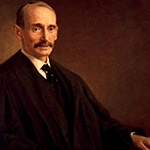
William R. Day (1903-1922)
William Day lived from 1849 to 1923.
Early Life
Day was born in Ravenna, Ohio. His father, Luther Day, was the chief justice of the Ohio Supreme Court. Day attended the University of Michigan, graduating in 1870. Following graduation, he spent an additional year in the school’s law department. Day then moved to Canton, Ohio, where he began practicing law with a partner, William A. Lynch.
Legal Career
Day spent much of his legal career working as a criminal and corporate lawyer, in addition to participating in politics as a Republican. During this time, Day developed a friendship with William McKinley, later becoming his political advisor. After McKinley was elected President of the United States, he appointed Day as Assistant Secretary of State under John Sherman, who was Secretary of State. President McKinley eventually became unsatisfied with Sherman and, in 1898, replaced him with Day.
Shortly after his appointment, Day left the position to negotiate an end to the Spanish-American War with Spain through the U.S. Peace Commission. Day’s final diplomatic effort consisted of leading the U.S. Peace Commission to Paris, where the Treaty of Paris was signed and the war was ended.
Upon his return from Europe, President McKinley nominated Day to a newly created seat on the United States Court of Appeals for the Sixth Circuit.
Appointment to the Supreme Court
On February 19, 1903, President McKinley’s successor, Vice President Theodore Roosevelt, nominated Day as an Associate Justice of the U.S. Supreme Court. During his tenure on the bench, Day wrote 439 opinions, of which only 18 were dissenting opinions.
Day distrusted large corporations, often voting in favor of antitrust majorities throughout his time on the bench. He sided with the government in the American Tobacco, Standard Oil, Union Pacific and Southern Pacific cases. Day was also an avid baseball fan; he asked for “regular updates” about the final game of the 1912 World Series from his clerk during the bench hearing of Standard Sanitary Mfg. Co. v. United States. Day retired from the bench in 1922.
Death
Day passed away on July 9, 1923 on Mackinac Island, Michigan at the age of 74. He is buried at West Lawn Cemetery in Canton, Ohio.
Notable Cases
Weeks v. United States (1914)
Buchanan v. Warley (1917)
Hammer v. Dagenhart (1918)







